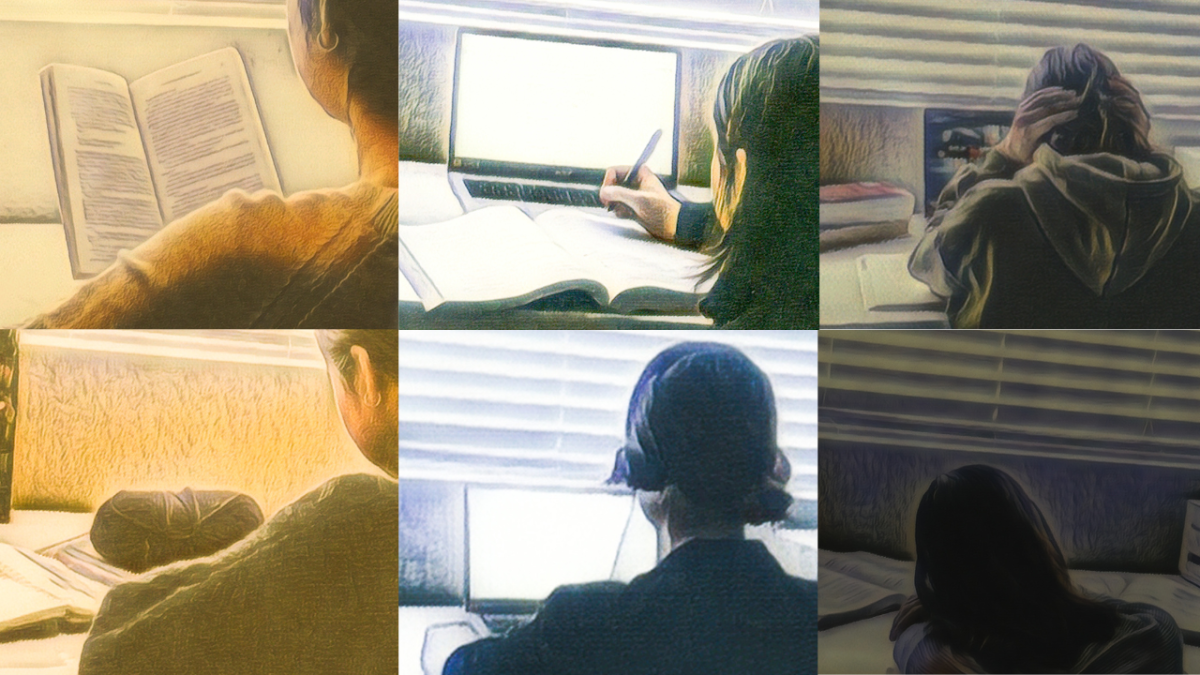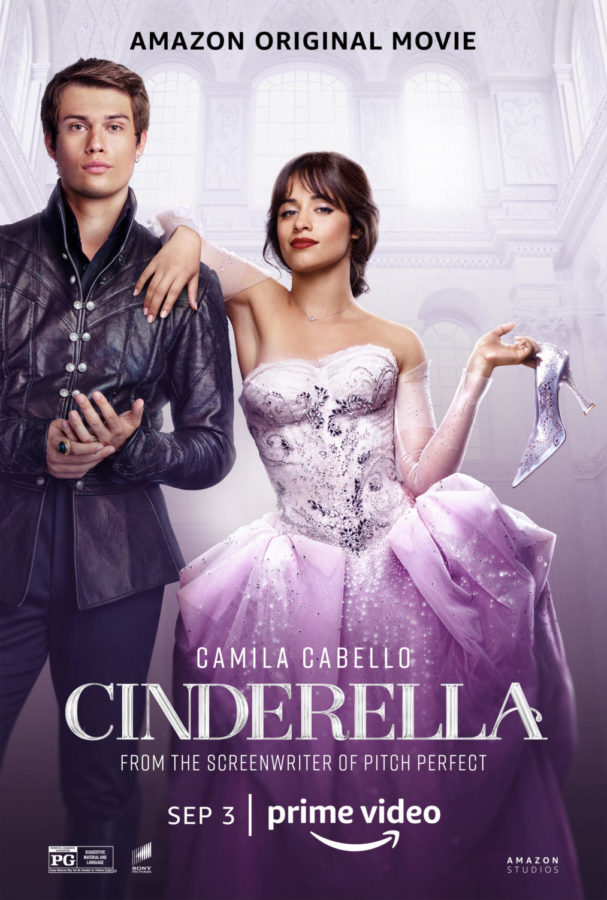Cinderella (2021): A Feminist Take on the Classic Tale
The cover poster of Cinderella (2021). Camila Cabello as Cinderella in the middle, with Nicholas Galitzine as the prince on her left.
September 24, 2021
Imagine a beautiful young woman, elated with joy, as she’s just discovered the love of her life. He, too, shares that sense of jubilant glee, knowing that she reciprocates his love and that he has found his one true soulmate. They dance the night away, share innocent laughs, engage in deep discussion, and exchange a magical kiss, all before the clock strikes midnight.
Even better, he is revealed to be the prince of a nearby kingdom and is frantically seeking a woman to marry. As a coming-of-age woman of the late nineteenth century, she faces social demands to find a spouse who can provide for her wellbeing, as well as the wellbeing of her stepmother and step-sisters.
Toward the end of their enchanting night, and in a moment of pure bliss, he proposes to her. Gallant and sincere, he kneels on the ground before her and recites four magical words that could change their lives forever — “Will you marry me?”
A smile races to her face, and she feels a warm spark of passion in her heart. Tears fill her eyes as she opens her mouth to speak. Much to the surprise of her newfound love, she rejects his proposal. She regretfully informs him that she would rather pursue a potential career opportunity than a life of love with her soulmate.
The entire hour and fifty-three minutes of Cinderella (2021) express the same sentiment. This retelling of the classic love story is nothing short of an homage to fourth-wave feminism. It is an unexpected interpretation of the classic tale, but that’s not to say that there haven’t been out-of-the-box depictions of the Cinderella story in the past. To fully understand the Cinderella (2021) controversy, it is necessary to look at an extended timeline of the progression of Cinderella.
The story of Cinderella is widely recognized to have originated around 6 B.C., where an urban legend came to light, telling the tale of a Greek servant who rose to social prominence through her marriage to an Egyptian king.
In the mid sixteen hundreds, a French author named Charles Perrault published a short story, which coined the more classic attributes of the Cinderella story: a pumpkin carriage, glass slipper, and a fairy godmother. A century later, the Brothers Grimm retold the Perrault story in their folklore collection of fairy tales, Children’s and Household Tales.
In 1914, the fantastical tale was adapted to film form. The Perrault-inspired rendition of Cinderella presented the life story of an oppressed woman who marries a mysterious prince and leaves her complicated home life. With a running time of fifty-two minutes, Cinderella (1914) was the first modern-day interpretation of Cinderella.
The most well-known version of Cinderella appeared on the big screen in the 1950s when Walt Disney released the animated film Cinderella (1958). Colorful animation, likable characters, and a memorable soundtrack joined beautifully to form the iconic Disney movie.
In 1998, a non-traditional Cinderella story came to cinemas, as Andy Tennant showed audiences a new layer of the Cinderella persona. The main character in this adaptation was a passionate and spirited young woman, going to the most extreme lengths to be with her true love. Ever After: A Cinderella Story (1998) remains a beloved romantic film to this day, as audiences have come to enjoy the more audacious side of Cinderella.
In 2016, a Disney live-action version of Cinderella introduced a more innocent version of the popular character. Lily James gracefully performed the titular role in Cinderella (2016), as her version of the character lived to “have courage and be kind.”
Although these adaptations took a different route to recount the story, they all share one unvarying attribute: a tormented heroine rises beyond her social standing through a marriage to her true love. That crucial aspect is the very essence of the Cinderella story. A young woman gleefully abandoning her troubled life to follow her heart is the crux of what the Cinderella story represents.
With the central theme of love conquering all, critics and audience members alike have expressed mixed feelings regarding the 2021 adaptation. Laura Stanley, of The Metro (UK), claimed that she was disappointed with the new film. She condemned its elimination of traditional features and was bewildered by the fact that the new movie portrayed “love [to be] considered a plot point worth circumventing.” Alexandra Herrada (11), a junior at Yorba Linda High School and self-proclaimed Disney enthusiast, lamented that the film “did not feel like Cinderella.” She went on to describe how she enjoyed the movie for its music and vibrant set designs but had trouble understanding “the connection to the original Cinderella story.”
Seeing a bright young woman who chooses her career over true love is nothing short of inspiring. In the twenty-first century, and after more than 100 years of pursuing equality of the sexes, a film that portrays a career-motivated woman is not at all shocking. The problem, however, is that the story of Cinderella does not fit that mold.
The most critical issue with the plot of Cinderella is that it poses an unrealistic ultimatum. Neither the twenty-first-century woman nor the eighteenth-century-woman, for that matter, finds herself in a position where she is forced to choose between her career and her true love. Nor should she have to choose between one or the other. And it goes both ways for the men. Why should Cinderella’s prince have to choose between marrying Cinderella as the prince of his kingdom, or abdicating his position on account of her ambitions?
The solution isn’t a simple one way or the other, and it certainly isn’t a yes/no proposition as it was painted to be in Cinderella (2021). Giving Cinderella entrepreneurial endeavours is a fantastic 2021 twist to a tale that is traced back to the B.C. Nevertheless, making her career her only interest is a flaw that not only fails the standards of the plot, but also the standards of society.
Cinderella (2021), to its core, revolves around the idea that women are victims in a patriarchal society and that they should revolt that system by claiming female superiority. In a story about love and marriage, patriarchal subjugation shouldn’t be exchanged for matriarchal subjugation. Cinderella shouldn’t have to give up her career in order to be with her true love, but her prince shouldn’t have to give up his career to be with her either. In the instance of Cinderella (2021), personal sacrifice seems to be inevitable, but it should be equitable to both parties.
Perhaps, in a few years, there will be yet another version of the timeless tale, and audiences will get to see a more fair-minded ending to the story. A resolution where Cinderella’s prince gets his happy ending too.






































